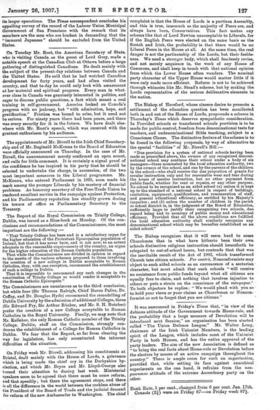On Friday week Mr. Birrell, addressing his constituents at Bristol,
dealt mainly with the House of Lords, a grievance which is being made the chief cry in the Derbyshire by- election, and which Mr. Bryce and Mr. Lloyd-George also turned their attention to during last week. Ministerial speakers seem to be agreed that there must be some reform, and that speedily ; but there the agreement stops, and there is all the difference in the world between the reckless abuse of the President of the Board of Trade and the judicial demand for reform of the new Ambassador to Washington. The chief complaint is that the House of Lords is a partisan Assembly, and this is true, inasmuch as the majority of Peers are, and always have been, Conservatives. This fact makes any scheme like that of Lord Newton unacceptable to Liberals, for if the English Peers were elected on the same basis as the Scotch and Irish, the probability is that there would be no Liberal Peers in the House at all. At the same time, the real- danger is not the partisanship of the Lords, but their feeble.. fleas. We need a stronger body, which shall fearlessly revise, and not merely acquiesce in, the work of any House of Commons, and shall keep in touch with that national opinion- from which the Lower House often wanders. The nominal party character of the Upper House would matter little if it were only made more efficient. Reform is not to be achieved through whimsies like Mr. Stead's scheme, but by making the Lords representative of the serious deliberative elements in the nation.






















































 Previous page
Previous page